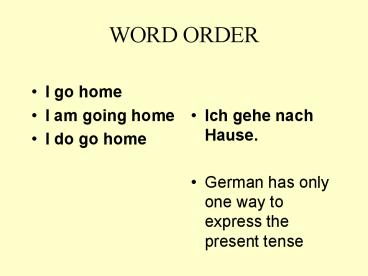WORD ORDER - PowerPoint PPT Presentation
1 / 8
Title:
WORD ORDER
Description:
German has only one way to express the present tense. WORD ORDER ... In the summer, I ride my bike to the university. Im Sommer fahre ich mit dem Fahrrad zur Uni. ... – PowerPoint PPT presentation
Number of Views:94
Avg rating:3.0/5.0
Title: WORD ORDER
1
WORD ORDER
- I go home
- I am going home
- I do go home
- Ich gehe nach Hause.
- German has only one way to express the present
tense
2
WORD ORDER
- Tonight, Gordon is going to the movie theatre.
- Gordon is going to the movie theatre tonight.
- Tonight, Gordon goes to the movie theatre.
- Gordon goes to the movie theatre tonight.
3
WORD ORDER
- Tonight, Gordon is going to the movie theatre.
- Heute abend geht Gordon ins Kino.
- Gordon geht heute abend ins Kino.
- (Ins Kino geht Gordon heute abend.)
- The cardinal rule of word order in German is to
put the verb in second position. - Second position does not mean second word, but
second grammatical element.
4
WORD ORDER
- In the summer, I ride my bike to the university
- Im Sommer fahre ich mit dem Fahrrad zur Uni.
- Ich fahre im Sommer mit dem Fahrrad
zur Uni. - Parts of the sentence are arranged in the
following order time - manner - place
5
WORD ORDER
- In the winter, I take the streetcar to the
university - Im Winter
- nehme
- ich
- die Straßenbahn
- zur Uni.
6
WORD ORDER
- In the winter, I take the streetcar to the
university - Ich
- nehme
- im Winter
- die Straßenbahn
- zur Uni.
7
verb adverb
- gern adverb
- He drives fast
- The party started early
- gern gt to like (verb) to do s.th.
- I like to play Basketball
- I play (to like) Basketball
- Ich spiele gern Basketball
- Er sieht gern Filme.
- Sie hört gern Jazz
8
Es gibt
- The expression es gibt (from the verb geben
to give) means there exists, but is usually
represented in English by - there is (singular) or there are (plural)
- Es gibt nur eine Universität in Wolfville.
(There is only one University in Wolfville.) - Es gibt viele Restaurants in Wolfville.
(There are many restaurants in
Wolfville.)
















![[PDF] DOWNLOAD Ultimate Word Search Challenge: Hard Wordsearches for E PowerPoint PPT Presentation](https://s3.amazonaws.com/images.powershow.com/10103847.th0.jpg?_=20240821032)














